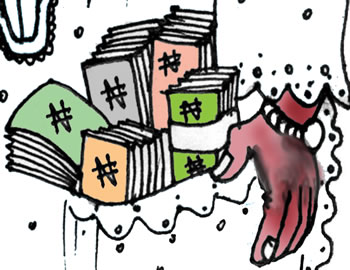There is nothing new under the sun, so goes a popular saying. But for most Nigerians, the prevailing economic crunch is actually something very new in this clime. By the day their means of survival are being eroded to the extent that even eking out a living for those who pride themselves as members of the middle class has become such a herculean task. And for those who are in the lowest rung of the economic ladder, this is the worst of times. The truth is that the number of those who are unable to make ends meet and therefore cannot afford the basic necessities of life is growing in geometric proportion in our land. Hunger and despondency have become everyday experiences in many homes. The times are hard, survival is difficult and hope has become a rare commodity.
Indeed, those who should know and who manage the country’s economy have, in a manner unseen before and with unusual candour, owned up and confirmed that Nigeria is in its worst economic crisis. And the indices are staggering and numbing at the same time. The prognosis is also very bleak. According to verifiable statistics, close to 26.6 million Nigerians are out of job with over four million losing their jobs or being underemployed in the last one year. Nobody can dispute these figures and some would even describe it as conservative. In the last six months, a number of banks have shown many employees the way out, while more and more businesses are closing shop due to unfavorable economic conditions. And the naira has taken its worst battering in recent times, losing more than 300 percent of its value, further making the economy to become prostrate. I dare say that there is something critically wrong with the economy other than the fall of the price of crude oil and the unbridled corruption of the past era. Yes, the fall in the price of oil and corruption could have exacerbated the crisis, the fact remains that something is not holding together in our economic policies and its implementation.
For the first time in living memory, some categories of workers, who no matter what, always smiled to the bank at the end of the month, are now being owed months and months of salary arrears. This is the first time that state government and other government-owned MDAs are routinely defaulting in the payment of wages. Some states owe workers as much as 15 months salary arrears, while others have resorted to the payment of half salary to civil servants. It got so bad recently that some state governments began to contemplate a three-day a week working policy in order to cut their wage bill.
It is double jeopardy for government workers in many states. The state governments are defaulting in remitting deductions from workers’ salaries to the appropriate quarters. After saving for years with their Cooperative society, they cannot even access loan to send their children to school and meet other pressing needs, as government has failed to remit deductions from their salaries, while also not paying them the remainder of the salary. For pensioners, the situation is worse. They stay on endless queues to collect the pittance that is no longer being paid as and at when due, with some of them actually dying while waiting to collect their entitlements. And since even governments at the state and local government levels are defaulting in salary payments, they have lost the moral authority to compel private concerns that are not paying their workers to do so.
Not that we have not had periods and even spate of economic recessions in the past. Of course, we have had some bad times that have impacted negatively on the generality of the people, but after some rejigging of policies and a number of stimulus plans, relative stability returned and the economy became reflated and respite came the way of the people. But this time round, the policies and stimulus plans are not working, and there appears to be no end in sight to the suffering in the land. Due to the fall of the naira and interplay of economic forces, the prices of goods and services are not just increasing, but hitting the roof. More and more Nigerians are in dire situation and can barely feed themselves. Life is becoming nasty, brutish and short, while the crime rates continue to soar, partly a direct consequence of the worsening economic situation and the greed of a few desperadoes.
However, the country’s leaders must rise to the occasion. Something needs to be done and very urgently too to halt the current dangerous trend. It is good to sound upbeat and give words of encouragement to the people, but it is not enough. Our leaders must back their words with deeds and we should begin to see some positive turn around in the economy with direct benefit to the generality of the people. The economic managers must reassess their policies and call for help if and when necessary.
- Adebanjo sent this piece via obanijesu@yahoo.com






